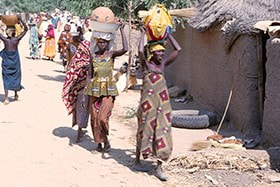
The 62nd session of the Commission on the Status of Women (CSW) concluded March 23rd after a long week of negotiations. The CSW is the principal global intergovernmental body dedicated to the promotion of gender equality and the empowerment of women. Observers claim it was one of the most successful commissions in recent years, in terms of process and outcome. This session focused on the challenges and opportunities in achieving gender equality and the empowerment of rural women and girls, a population all too often disregarded and amongst those most left behind.
New commitments
Major advances were reached on diversity and the need to address multiple and intersecting forms of discrimination faced by rural women and girls. New commitments were made on addressing reproductive health disparities, maternal mortality and the health workforce.
Existing commitments on sexual and reproductive health and reproductive rights were reaffirmed. The agreed conclusions also commit to girls’ education and addressing violence and harassment in schools, as well as menstrual health, education and information on sexual and reproductive health and support for pregnant and parenting girls.
Champions across the globe
The outcome of the text demonstrates the strong commitment of member-states to women’s and girls’ rights. Particularly Latin America, the so-called Mountain group (including Norway and Canada), as well as the European Union, but also Tunesia and Lebanon championed women’s and girls’ SRHR.
As part of Countdown 2030 Europe, Sensoa actively contributed to the negotiations, by providing recommendations to Belgium’s Ministry of Foreign Affairs on how to best advance SRHR for rural women and girls.
United Nations, what’s next?
The success of the negotiations raises expectations for the upcoming Commission on Population and Development (CPD), 9-13 April, when the UN Member States will discuss “Sustainable cities, human mobility and international migration”. Fast urban population growth leads to increased pressure on SRHR interventions, access to health services and other support structures, particularly affecting the many young people who move from rural into urban areas. Sensoa has provided guidance on the zero draft and will follow-up the negotiations.
Major advances were reached on diversity and the need to address multiple and intersecting forms of discrimination faced by rural women and girls. New commitments were made on addressing reproductive health disparities, maternal mortality and the health workforce.
Existing commitments on sexual and reproductive health and reproductive rights were reaffirmed. The agreed conclusions also commit to girls’ education and addressing violence and harassment in schools, as well as menstrual health, education and information on sexual and reproductive health and support for pregnant and parenting girls.
Champions across the globe
The outcome of the text demonstrates the strong commitment of member-states to women’s and girls’ rights. Particularly Latin America, the so-called Mountain group (including Norway and Canada), as well as the European Union, but also Tunesia and Lebanon championed women’s and girls’ SRHR.
As part of Countdown 2030 Europe, Sensoa actively contributed to the negotiations, by providing recommendations to Belgium’s Ministry of Foreign Affairs on how to best advance SRHR for rural women and girls.
United Nations, what’s next?
The success of the negotiations raises expectations for the upcoming Commission on Population and Development (CPD), 9-13 April, when the UN Member States will discuss “Sustainable cities, human mobility and international migration”. Fast urban population growth leads to increased pressure on SRHR interventions, access to health services and other support structures, particularly affecting the many young people who move from rural into urban areas. Sensoa has provided guidance on the zero draft and will follow-up the negotiations.

 RSS Feed
RSS Feed